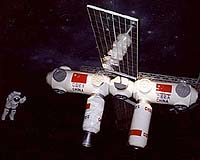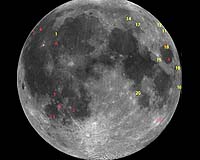|
Russia's Involvment with World Space Programs |
|
|
..
Beijing, China (SPX) Nov 09, 2005
Russia is ready to help China implement its lunar research program, the head of the Russian Federal Space Agency said Monday, reports RIA Novosti. Anatoly Perminov said China had undoubtedly become one of the leading space powers since conducting a successful manned mission involving the Shenzhou 6 spacecraft. "I think the next stages of [China's] manned space flight program will presumably involve a crew of astronauts, a space walk, and the construction of a space station," he said. Perminov said Russia could help China train its astronauts for a space walk and develop lunar research equipment. He explained that Russia did not intend to participate in a joint research program but to simply provide assistance, including support for China's manned lunar exploration, a project envisioned for 2018. "Russia does not have a special lunar research program," Perminov said, adding that the two countries had approved a strategic concept to conduct unmanned lunar research under their current bilateral space cooperation program, which expires in 2006. According to the official, Russia and China are pursuing successful completion of the current program and a new cooperation program for 2007-2010, which envisages construction of new space systems, including an observatory, radio telescopes, and remote sensing equipment to study Mars' moon Phobos. "China has expressed interest in the projects and has sent us its proposals, which we are reviewing now," Perminov said, adding that they might be approved by the end of 2006. SOURCE: Moon Daily |
|
|
Russia And India Sign Joint Lunar Research Deal ..
Moscow (RIA Novosti) Nov 13, 2007
Russia's Federal Space Agency (Roskosmos) and the Indian Department of Space have signed a joint lunar research and exploration agreement, the Russian agency said on Monday. The agreement was signed by Roskosmos chief Anatoly Perminov and Madhavan Nair, secretary of India's Department of Space and chairman of the Space Commission. Indian Prime Minister Manmohan Singh is currently on an official visit to Moscow. Georgy Polishchuk, general director of Russia's Lavochkin design bureau, said Russia would launch an unmanned mission to the Moon, Luna-Glob, in 2010. The second mission, which will include putting a new-generation 400-kg Lunokhod unmanned rover on the Moon, will start in 2011. "The first mission will be solely Russian, but the second will be carried out in conjunction with India," Polishchuk said. He said India will provide a rocket and a flight module for the mission, which will be launched from an Indian space center. The third and fourth stages (2012-2015) will include the study of mineral resources and other scientific and research experiments on the Moon. Russia, a pioneer in robotic lunar research, abandoned its lunar exploration program with the end of the Moon race in the mid-1970s, but the idea of exploring the Earth's natural satellite has been revisited recently, due to ambitious international projects to develop the Moon's resources and to use it as a stepping-stone for further space exploration. Roskosmos said earlier its first unmanned flight will include a lunar orbiter that will fire 12 penetrators across diverse regions of the Moon to create a seismic network, which will be used to study the Moon's origin. After firing the penetrators, the mother ship will deliver a polar station, equipped with a mass spectrometer and neutron spectrometer, to the surface. The objective of the station is to detect water ice deposits in the polar zones of the Moon. The device, developed by Russian scientists, will first be tested through NASA's Lunar Reconnaissance Orbiter project, to be launched in 2008. In the 1950s-1970s, the Soviet Union carried out 60 robotic lunar missions, of which about 20 were partially or fully successful. Original Source: RIA Novosti |
|
| FAIR USE NOTICE: This page contains copyrighted material the use of which has not been specifically authorized by the copyright owner. Pegasus Research Consortium distributes this material without profit to those who have expressed a prior interest in receiving the included information for research and educational purposes. We believe this constitutes a fair use of any such copyrighted material as provided for in 17 U.S.C § 107. If you wish to use copyrighted material from this site for purposes of your own that go beyond fair use, you must obtain permission from the copyright owner. | |
|
|


